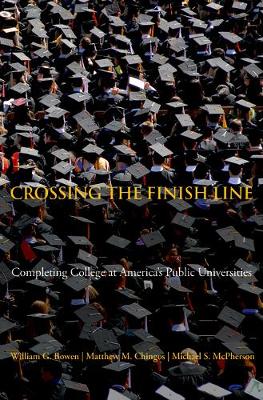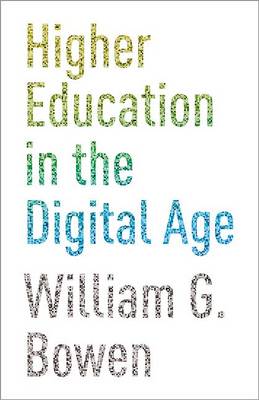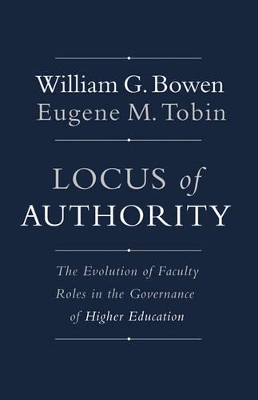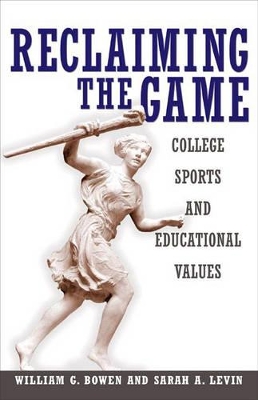The William G. Bowen
5 total works
The president of Williams College faces a firestorm for not allowing the women's lacrosse team to postpone exams to attend the playoffs. The University of Michigan loses $2.8 million on athletics despite averaging 110,000 fans at each home football game. Schools across the country struggle with the tradeoffs involved with recruiting athletes and updating facilities for dozens of varsity sports. Does increasing intensification of college sports support or detract from higher education's core mission? The authors introduce facts into a terrain overrun by emotions and enduring myths. Using the same database that informed "The Shape of the River", they analyse data on 90,000 students who attended thirty selective colleges and universities in the 1950s, 1970s, and 1990s. Drawing also on historical research and new information on giving and spending, the authors demonstrate how athletics influence the class composition and campus ethos of selective schools, as well as the messages that these institutions send to prospective students, their parents, and society at large.
The authors show that athletic programs raise even more difficult questions of educational policy for small private colleges and highly selective universities than they do for big-time scholarship-granting schools. They discover that today's athletes, more so than their predecessors, enter college less academically well-prepared and with different goals and values than their classmates - differences that lead to different lives. They reveal than gender equity efforts have wrought large, sometimes unanticipated changes, and they show that the alumni appetite for winning teams is not - as schools often assume - insatiable. If a culprit emerges, it is the unquestioned spread of a changed athletic culture through the emulation of highly publicised teams by low-profile sports, of men's programs by women's, and of athletic powerhouses by small colleges. The authors celebrate the benefits of collegiate sports, while identifying the subtle ways in which athletic intensification can pull even prestigious institutions from their missions.
By examining how athletes and other graduates view The Game of Life - and how colleges shape society's view of what its rules should be - the authors go far beyond sports. They tell us about higher education today: the ways in which colleges set policies, reinforce or neglect their core mission, and send signals about what matters.
The authors show that athletic programs raise even more difficult questions of educational policy for small private colleges and highly selective universities than they do for big-time scholarship-granting schools. They discover that today's athletes, more so than their predecessors, enter college less academically well-prepared and with different goals and values than their classmates - differences that lead to different lives. They reveal than gender equity efforts have wrought large, sometimes unanticipated changes, and they show that the alumni appetite for winning teams is not - as schools often assume - insatiable. If a culprit emerges, it is the unquestioned spread of a changed athletic culture through the emulation of highly publicised teams by low-profile sports, of men's programs by women's, and of athletic powerhouses by small colleges. The authors celebrate the benefits of collegiate sports, while identifying the subtle ways in which athletic intensification can pull even prestigious institutions from their missions.
By examining how athletes and other graduates view The Game of Life - and how colleges shape society's view of what its rules should be - the authors go far beyond sports. They tell us about higher education today: the ways in which colleges set policies, reinforce or neglect their core mission, and send signals about what matters.
Crossing the Finish Line
by William G Bowen, Matthew M Chingos, and Michael S. McPherson
Published 1 January 2009
The United States has long been a model for accessible, affordable education, as exemplified by the country's public universities. And yet less than 60 percent of the students entering American universities today are graduating. Why is this happening, and what can be done? "Crossing the Finish Line" provides the most detailed exploration ever of college completion at America's public universities. This groundbreaking book sheds light on such serious issues as dropout rates linked to race, gender, and socioeconomic status. Probing graduation rates at twenty-one flagship public universities and four statewide systems of public higher education, the authors focus on the progress of students in the entering class of 1999 - from entry to graduation, transfer, or withdrawal. They examine the effects of parental education, family income, race and gender, high school grades, test scores, financial aid, and characteristics of universities attended (especially their selectivity). The conclusions are compelling: minority students and students from poor families have markedly lower graduation rates - and take longer to earn degrees - even when other variables are taken into account.
Noting the strong performance of transfer students and the effects of financial constraints on student retention, the authors call for improved transfer and financial aid policies, and suggest ways of improving the sorting processes that match students to institutions. An outstanding combination of evidence and analysis, "Crossing the Finish Line" should be read by everyone who cares about the nation's higher education system.
Noting the strong performance of transfer students and the effects of financial constraints on student retention, the authors call for improved transfer and financial aid policies, and suggest ways of improving the sorting processes that match students to institutions. An outstanding combination of evidence and analysis, "Crossing the Finish Line" should be read by everyone who cares about the nation's higher education system.
Two of the most visible and important trends in higher education today are its exploding costs and the rapid expansion of online learning. Could the growth in online courses slow the rising cost of college and help solve the crisis of affordability? In this short and incisive book, William G. Bowen, one of the foremost experts on the intersection of education and economics, explains why, despite his earlier skepticism, he now believes technology has the potential to help rein in costs without negatively affecting student learning. As a former president of Princeton University, an economist, and author of many books on education, including the acclaimed bestseller The Shape of the River, Bowen speaks with unique expertise on the subject. Surveying the dizzying array of new technology-based teaching and learning initiatives, including the highly publicized emergence of "massive open online courses" (MOOCs), Bowen argues that such technologies could transform traditional higher education--allowing it at last to curb rising costs by increasing productivity, while preserving quality and protecting core values.
But the challenges, which are organizational and philosophical as much as technological, are daunting. They include providing hard evidence of whether online education is cost-effective in various settings, rethinking the governance and decision-making structures of higher education, and developing customizable technological platforms. Yet, Bowen remains optimistic that the potential payoff is great. Based on the 2012 Tanner Lectures on Human Values, delivered at Stanford University, the book includes responses from Stanford president John Hennessy, Harvard University psychologist Howard Gardner, Columbia University literature professor Andrew Delbanco, and Coursera cofounder Daphne Koller.
But the challenges, which are organizational and philosophical as much as technological, are daunting. They include providing hard evidence of whether online education is cost-effective in various settings, rethinking the governance and decision-making structures of higher education, and developing customizable technological platforms. Yet, Bowen remains optimistic that the potential payoff is great. Based on the 2012 Tanner Lectures on Human Values, delivered at Stanford University, the book includes responses from Stanford president John Hennessy, Harvard University psychologist Howard Gardner, Columbia University literature professor Andrew Delbanco, and Coursera cofounder Daphne Koller.
Do higher education institutions have what it takes to reform effectively from within? Locus of Authority argues that every issue facing today's colleges and universities, from stagnant degree completion rates to worrisome cost increases, is exacerbated by a century-old system of governance that desperately requires change. While prior studies have focused on boards of trustees and presidents, few have looked at the place of faculty within the governance system. Bowen and Tobin explore whether departments remain the best ways through which to organize decision making and if the concepts of academic freedom and shared governance need to be sharpened and redefined. Using case studies of four very different institutions, the authors demonstrate that college and university governance has capably adjusted to the necessities of the moment and governance norms and policies should be assessed in the context of historical events. They also demonstrate that successful reform depends on the artful consideration of technological, financial, and cultural developments.
Locus of Authority shows that the consequences of not addressing college and university governance are more than the nation can afford.
Locus of Authority shows that the consequences of not addressing college and university governance are more than the nation can afford.
In Reclaiming the Game, William Bowen and Sarah Levin disentangle the admissions and academic experiences of recruited athletes, walk-on athletes, and other students. In a field overwhelmed by reliance on anecdotes, the factual findings are striking--and sobering. Anyone seriously concerned about higher education will find it hard to wish away the evidence that athletic recruitment is problematic even at those schools that do not offer athletic scholarships. Thanks to an expansion of the College and Beyond database that resulted in the highly influential studies The Shape of the River and The Game of Life, the authors are able to analyze in great detail the backgrounds, academic qualifications, and college outcomes of athletes and their classmates at thirty-three academically selective colleges and universities that do not offer athletic scholarships. They show that recruited athletes at these schools are as much as four times more likely to gain admission than are other applicants with similar academic credentials.
The data also demonstrate that the typical recruit is substantially more likely to end up in the bottom third of the college class than is either the typical walk-on or the student who does not play college sports. Even more troubling is the dramatic evidence that recruited athletes "underperform:" they do even less well academically than predicted by their test scores and high school grades. Over the last four decades, the athletic-academic divide on elite campuses has widened substantially. This book examines the forces that have been driving this process and presents concrete proposals for reform. At its core, Reclaiming the Game is an argument for re-establishing athletics as a means of fulfilling--instead of undermining--the educational missions of our colleges and universities.
The data also demonstrate that the typical recruit is substantially more likely to end up in the bottom third of the college class than is either the typical walk-on or the student who does not play college sports. Even more troubling is the dramatic evidence that recruited athletes "underperform:" they do even less well academically than predicted by their test scores and high school grades. Over the last four decades, the athletic-academic divide on elite campuses has widened substantially. This book examines the forces that have been driving this process and presents concrete proposals for reform. At its core, Reclaiming the Game is an argument for re-establishing athletics as a means of fulfilling--instead of undermining--the educational missions of our colleges and universities.




